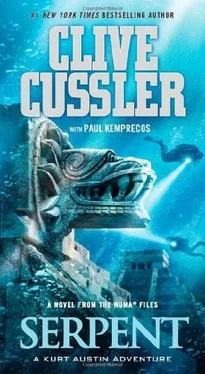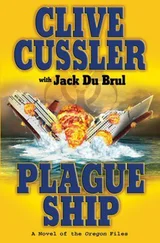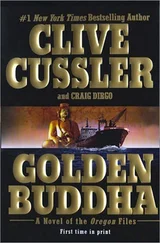There was a pause followed by a faint snort. "That might be a problem," the captain said, his voice burred with irritation. "We've lost the bow anchors. From the looks of the lines, they've been cut. Surface current's pushing us around. If we drop the bell, it'll swing like a big pendulum. Could knock us over."
"Looks like our pals covered their escape, Joe."
"I heard. Any chance of reattaching the anchor lines?"
Austin and Zavala were dangerously tired. The Hard Suits were not designed for hand-to-hand combat, and the metal skins with all their paraphernalia had become personal prisons.
"It's doable, but not by us. It'll be easier just to wrassle this thing up on our own. And that's not going to be easy." He asked the captain if he could get the boat roughly into the same position and hold it there.
"Not exactly, but close enough," McGinty said.
They were approaching the hull opening. The Monkfish should be right above them.
McGinty did a skillful job. The line they had used to lift the hull section dangled a short distance above the wreck. They attached the line to the slab, not easy without the fingers of the saturation divers to do the detailed work, then gave the captain the go-a-head.
"Okay, Cap," Austin said. "We're coming up."
45 AUSTIN HAD A GOOD VIEW OF THE impenetrable wall of fog bearing down on the Monkfish as he dangled like a hooked flounder over the ocean. The crane pivoted and lowered him onto the deck, where crewmen helped him out of the dripping gym suit like pages attending to an armored knight.
Hauled aboard a few minutes earlier, Zavala looked strangely shrunken without the benefit of his form-fitting hull. Like those of an astronaut coming out of free fall, Austin's first steps were wobbly. Zavala handed him a mug of hot coffee. A few sips of the strong brew got his blood circulating. Then they dealt with their top priority, a stiff-legged race for the nearest head. They came out smiling, After changing into warm dry clothes they went back on deck.
The trip up from the Andrea Doria wreck had been uneventful but tense, especially during the first few moments as the winch eased the strain with slow stop-and-go pulls and at the surface where the load lost its buoyancy. The skilled Monkfish crew attached more floats to make sure they didn't lose the stone, got it into a sling, then winched it aboard using the stern A-frame.
Austin gazed at the innocuous-looking block, now lying on a wooden pallet, and found it hard to believe it had caused so much trouble and cost so many lives. The slab was shaped vaguely like an oversized headstone, which was appropriate given all the people who'd been killed for its sake. The object was a little longer than a tall man, almost as wide and as thick. Austin knelt on the deck and ran his hand over the surface, which was going from black to dark gray as it dried. He traced the hieroglyphics, but they made no sense to him. Nothing about this case made sense.
Crew members covered the slab with a quilted protective material, then wrapped it in a plastic tarp. A small forklift transported the slab to a storage space at deck level. It didn't seem fragile, having weathered nearly half a century in a submerged armored truck and a ride to the surface, but he didn't want to take the chance that it would break into a thousand brittle pieces.
With sad eyes, Donatelli watched the stone being taken away. "So that's what all those men died for."
"The killing still hasn't stopped," Austin answered grimly as he squinted at the fog, which now encased the salvage ship in a yellowgray tomb that muffled sound and light. The temperature had dropped at least ten degrees. He shivered as he remembered Angelo's description of a similar fog bank that hid the Andrea Doria from eyes on the Stockholm.
"Let's check in with the captain," he suggested, and they climbed to the bridge.
Inside the wheelhouse McGinty motioned for them to come over to the radar screen and pointed to a white, blip against the green backdrop. Austin blinked. Maybe he'd been underwater too long. The blip's rapid progress across the screen was more like that of an aircraft than a boat.
"Is that vessel moving as fast as I think it is?" Zavala said.
"Goin' like a banshee," McGinty growled.
Austin tapped the screen with his finger. "Could be our bad boys."
McGinty's eyes sparkled. "When I was growing up in Southie the cops would swing the cruiser through the housing project and you'd see guys running in every direction. Cops
always found someone wanted for something. If you had a guilty conscience all you had to do was see that blue bubble atop the cruiser to get your legs moving. Same thing here, I'll bet."
"The guilty flee when none pursueth," Austin said. The blip passed other craft moving in the same direction as if they were stationary. "My guess is that those folks fleeth at about fifty knots."
McGinty let out a low whistle. "This looks like a big ship to me. I don't know of any vessels of size that can move like that."
"I do. It's called a Fast Ship. It's a new design. Company called Thornycroft and Giles makes them. They use a semiplaning monohull with water jets that eliminate propeller cavitation. Even a Fast Ship container vessel can cruise at fortyfive knots. The newer versions might even be faster. Cap, did you see any big boats around the wreck just before the attack?"
"This is a busy place." McGinty pushed his cap, back on his forehead as if it would help his memory "Lots of boats, fishermen mostly, coming or going. Did we actually see this ship? Maybe. There was a good-sized craft hunkering a mile or so away, but we lost it in the fog bank. I was busy with dive operations."
"My guess is that if we could cut through the corporate red tape, we'd find it was owned by Halcon Industries."
"Can we get air surveillance?" McGinty asked.
"Impossible in this fog. But what if we do find it? We'd need a warrant to go aboard."
Zavala had been listening silently, his mouth in an uncharacteristic frown. "Something's been bothering me," he said. "Those guys knew where we were and what we were doing. How did they know? We just decided to go after this thing a few days ago. We didn't exactly advertise our plans."
Austin and McGinty exchanged glances. "This operation involved a lot of people. Any one of them could have dropped enough of a hint to let the cat out of the bag." It was an explanation Austin didn't believe himself. His attackers were too well prepared.
Before long the wind shifted, blowing away the fog, Donatelli bid goodbye to the NUMA men and the Monkfish captain, and he and Antonio set off in the yacht. Austin promised to update the Doria survivor on NUMA's every move.
The Monkfish plowed through the fog and rounded Cape Cod, and before long they could see the lights of planes taking off and landing at Logan Airport. They steamed past the Boston Harbor Islands and tied up at a dock near the aquarium. Austin called an excited Dr. Orville and asked him to arrange for a truck to pick up the stone. Austin and Zavala followed the truck to Harvard and saw it safely under lock and key. Orville said he would work through the night to decipher the inscriptions if he had to and invited them to stay. Austin declined the invitation. He and Zavala were exhausted from the day's events and wanted to catch an early flight to Washington. After a light dinner they had a nightcap of Irish whiskey with McGinty, then crawled into their bunks and fell asleep almost immediately.
The tubular green-glassed tower of NUMA headquarters was like the welcome beacon of a lighthouse as the taxi navigated the unpredictable seas of Washington traffic. Austin and Zavala had caught the water shuttle to Logan Airport and were back in Washington by late morning. McGinty bid him adieu with a lung-shaking slap on the back and the highest of praise. Austin, he proclaimed, was a chip off his old man's block.
Читать дальше












